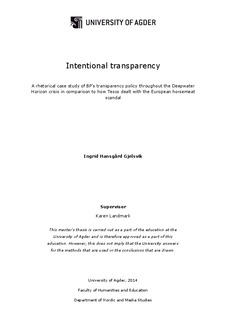| dc.contributor.author | Gjelsvik, Ingrid Hansgård | |
| dc.date.accessioned | 2014-09-24T06:20:50Z | |
| dc.date.available | 2014-09-24T06:20:50Z | |
| dc.date.issued | 2014 | |
| dc.identifier.uri | http://hdl.handle.net/11250/221254 | |
| dc.description | Masteroppgave i samfunnskommunikasjon – Universitetet i Agder 2014 | nb_NO |
| dc.description.abstract | In this thesis, I have studied how a major event such as a crisis changes the way a company promotes transparency in their corporate communication. To gain knowledge about this aspect of their communication I did a multicase study of two cases; BP and the Deepwater Horizon accident and Tesco and the horsemeat scandal.
Methodically I did a categorization of press releases from three selected periods. One year before the accident, during the accident and one year after the accident. This categorization was followed by email interviews as well as a rhetorical analysis of selected press releases from the two companies.
The primary findings of this thesis are divergent between the two organisations. BP’s press releases did not seem to change significantly considering the transparency shown in their press releases. Tesco’s press releases showed a significant change in how they promoted transparency in the area affected by the crisis. | nb_NO |
| dc.language.iso | eng | nb_NO |
| dc.publisher | Universitet i Agder / University of Agder | nb_NO |
| dc.subject | KOM500 | |
| dc.title | Intentional transparency : a rhetorical case study of BP's transparency policy throughout the Deepwater Horizon crisis in comparison to how Tesco dealt with the european horsmeat scandal | nb_NO |
| dc.type | Master thesis | nb_NO |
| dc.subject.nsi | VDP::Social science: 200::Media science and journalism: 310 | nb_NO |
| dc.source.pagenumber | 75 p. | nb_NO |
